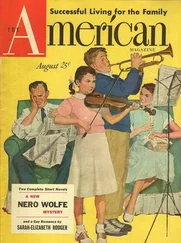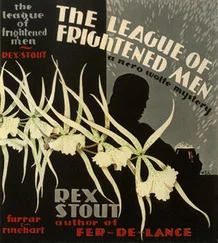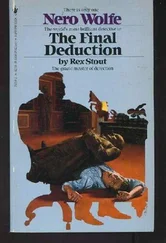Delia closed her eyes and read the note her mother had left — read it seeing it, though the paper itself was in a box at home in her closet. She read every word, her throat constricting. But her mother’s terror of the evil had been so great that she had made no attempt to attack it even in that farewell to her daughters; it had contained no mention, no reference at all, to the Reverend Rufus Toale. Nevertheless, Delia and Clara had known. Clara had admitted to Delia that it stared them in the face. And in spite of that, only two weeks ago, only a fortnight after their mother was buried, Clara had allowed Rufus Toale to enter their house and had talked with him! And again and again! And had put Delia off with evasions when she had expostulated.
Delia shivered in the coolness the evening had brought.
She opened her eyes. She heard the sound of footsteps at a distance on the path, but gave it only enough attention for a flitting assumption that it was the caretaker on his rounds. It was twilight, nearly dark, and she realized with a start that Clara might be worrying about her, and besides, she had something to do. She didn’t want to leave. If there was an answer anywhere, it was here. She had always before come to the cemetery in the morning, but now that she had been here in the dusk of evening, she would come again. It was more... it was better, with no sun shining, with night falling, with the air chill and silent gloom preparing to blanket the graves...
She became aware that the footsteps had approached quite close — and had stopped. As she started to turn her head a deep, musical voice sounded almost directly above her:
“Good evening, Miss Brand.”
She leaped to her feet and was facing the Reverend Rufus Toale.
His ludicrous straw hat, which he wore winter and summer, was in his hand, strands of his dark hair, with no gray, straggled on his high broad forehead, and a faint compression and twisting of his lips, obviously habitual, might have been characterized, by an impious or hostile tongue, as an unctuous smirk.
“Praise God,” he said.
Delia began to tremble from head to foot.
“I haven’t seen you here before,” he said, “since your mother was taken, though I know you have been coming. My services to the living, for His glory, take up my day and I can come only in the evening. You don’t let me see you, my child, though I have a message for you. I can help you, we can be helped together, by His grace and power and goodness and wisdom. You come, I fear, to this resting place of that sorely tried woman, your dear mother, only to sorrow in her defeat, but I come for strength.” He extended the hand that was not embarrassed by the hat. “I would like to lead you—”
“Get out of here.” Delia thought she was screaming, though in fact her voice was low, a dull dead monotone. “You... you... get out of here...”
Then she gave up. She couldn’t shoot him, because she had no gun. She couldn’t touch him — she couldn’t do anything. So suddenly she darted past him, to the path, leaving her hat there on the grass next to her mother’s grave, and ran. Her heroic resolve on a supreme retaliation to evil had descended to the level of that trite grotesquerie: a headlong terrified flight through a cemetery at the fall of night. She stumbled once but caught herself and arrived at the gate breathless.
She sat in her car, trembling all over, for a while, until it occurred to her that he might come, and then she started the engine and got the car moving, headed for Cody.
The driving helped to steady her. She liked to drive. Her father had taught her and she was good at it. The dashboard clock said 9:50 as she entered the residential section. She considered telephoning home, or going by way of Vulcan Street to stop at the house, but the route there would take her within two blocks of the Jackson address — and besides, when she saw or spoke to Clara she wanted to be able to announce an accomplished fact. So when she got to Blacktail Avenue she turned left and in another minute rolled to a stop at the curb in front of number 342.
She unfastened three buttons of her dress, retrieved the note from where she had pinned it and buttoned up again. Then she switched off the lights, climbed out and started up the path toward the door of the house; but came to a stop as the rays of headlights swept across her and a car turned into the driveway, scrunching the gravel, and halting opposite her. She heard the car door opening and a voice called:
“Hello, that you, Jean?”
“No! It’s me, Delia Brand!”
“Oh!” A dark blotch that was a wrap and a white spot that was a face approached across the lawn. “Surprise party?”
“I came to see your husband.”
“Then I’m afraid the surprise is on you. He’s not home. He’s down at the office.”
Delia glanced at the house.
“I know,” said Amy Jackson, born Sammis. “The lights are on. I always leave them on when I go out after dark. I’ve only been gone a few minutes, ran downtown to get something.”
“Are you sure he’s at the office?” That was tactless, Delia knew as she said it, but it was out.
“Yes, I — yes, that’s where he said he was going.”
“Much obliged. I guess I’ll drive down there. I just want to see him about something.”
She returned to the car, clutching the note in her hand, got in, and drove to Halley Street.
There was as little space for parking in front of the old Sammis Building as there had been in the afternoon; even less, for Delia was forced to go nearly to the next corner. She walked back. The sidewalk there was well lit and well populated, for The Haven was one of the centers of the town’s strange night life. Salesgirls and garage employees could and did bet a dime on the even at the roulette wheel, but Mortimer Cullen of Chicago had once dropped eighty thousand dollars at faro in five hours.
Delia had never been inside The Haven. She gave its bright windows only a passing glance as she went on to the door admitting to the stairway. The stairs themselves were quite dim, but, mounting, she found that the upper hall, with an electric bulb glowing, was better lit than in the daytime. On the door which said Sammis & Jackson the glass panel looked dark, with no light behind it, but she tried it anyway, found it unlocked and pushed it open. With the note in her hand she felt armed with authority, so she flipped the light switch. The door leading to Jackson’s room was closed, and she went and knocked on it. Silence. She knocked again and called his name, but got no response, so she opened that door too. The room was dark, as the front one had been. She wasn’t familiar with that light switch, but soon found it and turned it on. Then, after one glance, she jerked her head up and stiffened, and stood not breathing, and neither Ty Dillon nor anyone could have accused her of mimicry of movie stars as she held the pose.
A man was in the chair behind the desk, but not in any of the approved, or even disapproved, positions. It was as if he had bent far over to reach something on the floor, got hung on the arm, and whimsically stayed there.
Delia’s nerves were already quivering, had been for some time, and her impulse, after the first shock into rigidity, was to turn and flee screaming down the stairs. Doubtless she would have done that had not the familiarity of an object on the desk demanded, and got, her attention as her eyes began their movement away from the man in the chair. It lay near the edge of the desk closest to her, and she stared at it in amazement.
It was her handbag.
She continued to stare, still rigid; then instinctively, without thinking, stepped forward to get it. She took it in her hand, saw that it was indeed and unbelievably hers, started to tuck it under her arm, and then rested it on the desk again and with fingers that trembled not at all opened it.
Читать дальше












